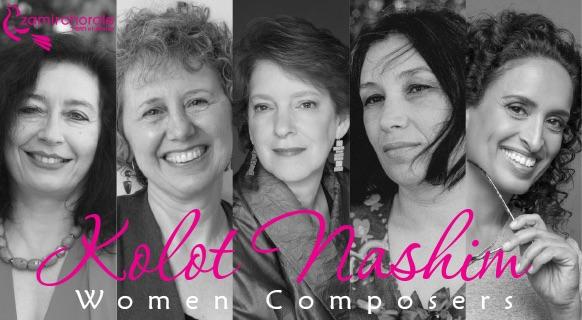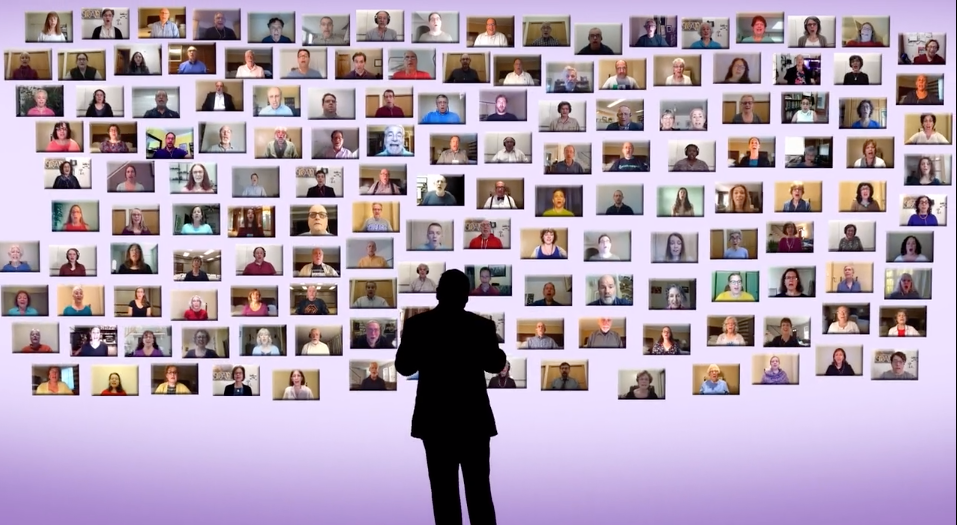|
Join Our List
|
 |
|
In This Issue
|
|
Josh Jacobson's Musings
Winter Roundup
Symposium and Concert:
Kolot Nashim: Jewish Music by Women Composers
|
|
While you're home...
|
|
The effects of COVID-19 are not only medical. They are emotional, economic, social, and spiritual. We know the importance of music to our well-being and hope to return to stages in the near future to bring the joy of Jewish music to audiences worldwide.
Until we can return to concert-making, listen to Zamir on
YouTube or on our
CDs.
|
Save the Dates for
Kolot Nashim:
Jewish Music by Women Composers
|

Two performances:
Wednesday, June 10, and
Thursday, June 11
7:30 pm
Slosberg Recital Hall,
Brandeis University, Waltham
For sponsorship and tickets,
In our season-ending concert, "Kolot Nashim: Jewish Music by Women Composers," we are delighted to offer music exclusively by women composers, songwriters, and lyricists. Our performance will celebrate the many women who have created and are now creating songs and compositions based on Jewish texts and themes.
ALSO:
Wednesday, May 20, 7:30 pm, Temple Reyim, 1860 Washington St, Auburndale, for a prelude to the concert: A Symposium on Jewish Music by Women Conductors
Co-sponsored by Temple Reyim and the Hadassah-Brandeis Institute. See Josh Jacobson's "Musings" in this issue for more.
Sponsorship and ticket information for the concert and symposium are available on
zamir.org.
|
|
Winter Roundup
|
Songs for Seniors
On February 2, we performed our annual
concert for the residents at Hebrew SeniorLife, featuring selections from our current repertoire as well as old favorites, including "Kol Han'shamah," "Alle Brider," "Uri Tsafon," and "Boker Shel Zahav." Assistant to the conductor Devin Lawrence and section leader Betty Bauman, and conducting interns Daniel Mahoney and Ariel Wyner, ably took a turn at the podium. The Chorale fanned out into the audience in a musical embrace for our now-traditional final selection, John Rutter's stirring "The Lord Bless You." We are always touched to see residents clap, sing, and sometimes dance along.
|

|
|
Created as part of Zamir's 50th- anniversary initiatives, JewishChoralMusic.com provides
a wide variety of Jewish traditions and experiences. We invite you to use this website as a resource to find material for your choir.
|
|
Halleluyoh Virtual Choir!
|

And don't forget to watch another 50th-anniversary initiative: a first-ever virtual choir using Louis Lewandowski's great "Halleluyoh." The virtual choir includes performances by
hundreds of singers from all around the world and incorporates visual history about Lewandowski and his community. Watch it now!
|
|
|
Dear Friends of Zamir,
As we adjust to the effects of the public health safety measures enacted to contain the Coronavirus, we offer a note from Artistic Director Joshua Jacobson:
These are difficult and dangerous times. Many public events have been canceled, including our concerts on March 15 and March 29. We intend to reschedule these concerts. The dress rehearsal for our "in the round" concert was so thrilling and so unique, we are determined to offer it to the public as soon as we are able. For the time being, rehearsals have been moved to virtual mode.
As of now, we are still planning to hold our May 20 symposium and June 10-11 concerts. We will monitor the situation as it develops. We pray that all our readers are well. We pray that we will return to normal modes of assembly as soon as possible.
In the meantime, please enjoy Josh's reflections below on women in music, and a sneak preview of the June 10-11 concerts.
|
|
JOSH JACOBSON'S MUSINGS
|
|
In each issue of E-Notes, Artistic Director Joshua Jacobson offers his unique insights and experiences as a world-renowned scholar, composer, conductor, and influential teacher of Jewish music.
 |
|
 |
(Photo by Andy Weigl) |
For centuries, women in the field of music could be heard but not published. There were many well-known female singers. And we should point out that among them was the renowned soprano known as Madama Europa, sister of the great Jewish composer Salamone Rossi. When it comes to women composers in history, the rare exceptions include Hildegard von Bingen (1098-1179) Francesca Caccini (1587-1640), and Barbara Strozzi (1619-1677). Fanny Mendelssohn (1805-1847) was a talented pianist and composer, but to have her music published, it had to appear under the authorship of her famous brother, Felix. Clara
|
For centuries, authorities in churches, mosques, and synagogues did not allow the voices of women to be heard.
|
Schumann (1819-1896), wife of the famous composer Robert Schumann, wrote, "I once believed that I possessed creative talent, but I have given up this idea. A woman must not desire to compose--there has never yet been one able to do it. Should I expect to be the one?"
Yes, Clara, you should. Although five years ago, compositions by women accounted for just 1.8 percent of the overall season of major symphony orchestras, increasingly now we are hearing music by early-20th-century pioneers Cécile Chaminade, Amy Beach, and Ethel Smyth, as well as contemporary composers such as Andrea Clearfield and Anna Thorvaldsdottir.
In the sphere of liturgical music,
 |
|
 |
Fanny Mendelssohn |
the picture was even darker. For centuries, authorities in churches, mosques, and synagogues did not allow the voices of women to be heard. The first woman formally invested as a cantor was Barbara Ostfeld Horowitz, who graduated from Hebrew Union College in 1975. But today women's voices are increasingly heard in the synagogue. In ultra-Orthodox Chabad communities, there are farbrengen (spiritual singing sessions) exclusively for women. In the major cantorial seminaries, women now outnumber men. The melodies of Debbie Friedman are now considered "traditional."
|
|
 |
| Noreen Green |
 |
In 2001, at the suggestion of alto Johanna Ehrmann, the Zamir Chorale of Boston presented a symposium cum concert entitled, "Jewish Women in Music." Nineteen years later, we will revisit the topic as we again celebrate women whose works have contributed to the Jewish concert stage.
On May 20, we are hosting a mini symposium on the topic with a distinguished panel, including composers
Meira Warshauer (
University of South Carolina
)
and
Benjie Ellen Schiller (Hebrew Union College),
conductors
Noreen Green (
Los Angeles Jewish Symphony
)
and
Julia Zavadsky (Temple University)
, and musicologists
Rebecca Cypess (Rutgers University)
and Judith Pinnolis
 |
|
 |
Molly Picon |
(Berklee College of Music). We are planning a freewheeling discussion on various themes, such as "Why have women been excluded from the canon for centuries?" "What are the challenges you face today as a composer?" and "Is there a unique sound to music composed by women?"
Our concert on June 10 (repeated June 11) will feature gorgeous music by an international array of women: composers Elena Kats-Chernin, Kristen Lampl, Alice Parker, Shulamit Ran, Benjie Ellen Schiller, Judith Shatin, Meira Warshauer; and songwriters Mira Awad, Nira Chen, Nurit Hirsch, Sara Levi-Tanai, Achinoam Nini, Molly Picon, and Naomi Shemer.
We hope that you will enjoy learning about and listening to this music as much as we have enjoyed discovering it and preparing it for performance.
|
|
KEEP IN TOUCH!
|
|
As always, let us know what you're up to--we love hearing from our friends near and far. Stay safe and have a Chag Kasher v'Sameach--Happy Passover! We hope to see you at our symposium in May and at our June concerts at Brandeis on June 10 and 11.
Barbara Gaffin Deborah Sosin
Managing Director Editor, E-Notes
|
|
| |
|